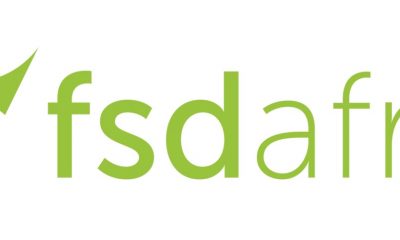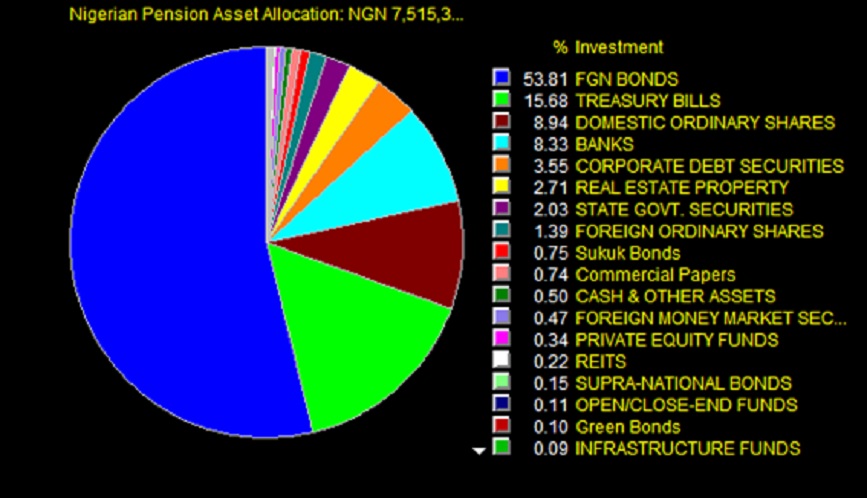Economy
Nigerian Pension Funds Outperform Bench Mark Index


By Quantitative Financial Analytics
Nigerian pension funds once again recorded another year of brilliant performance in 2016 roundly beating the NSE Pension Index by wide margins.
The NSE Pension index ended the year 2016 at 810.04 points from its 2015 value of 815.16 points, thereby ending the year down by 5.13 points or -0.63%.
Savings Retirement Accounts (RSA):
Except for APT Pension Retirement Saving Account which ended the year with a negative performance of 22.96%, having lost N0.65 on the unit price of the RSA, every other RSA ended the year with positive performance of 8% or greater. The highest return of 12.67% came from AXA Mansard Pension Retirement Savings Account, followed by Future Unity Glanvills (FUG) RSA with 11.93%
Retiree Accounts:
The performance of the Retiree Accounts followed closely that of the RSA but unlike the RSAs, the Retiree Accounts did much better with no losses recorded by any one of them. Trust Pension Fund Retiree Account led the performance league with 14.68%. All the Retiree Accounts but one, recorded double digit positive return in 2016.
Asset Allocation is Everything
Asset allocation has been said to be responsible for most of the investment fortunes in history. That too can be rightly said about Nigerian pension funds. The implication of asset allocation is that it matters how a portfolio is divided between Bond, Equities, Cash, Money Market and other asset classes. Most Pension funds in Nigeria allocate at least 75% of their Asset Under Management (AUM) to fixed income securities (Government Bonds, Treasury Bills and corporate bonds). The interest rate on those assets has been on the increase over time and the CBN has signaled that it does not plan to reduce the rates any time soon. Though there is an inverse relationship between interest rate (yield) and bond prices, the increasing yield environment especially at the shorter end of the yield curve implies that matured bonds or treasury bills are being reinvested at higher yields and lower prices which benefits the pension funds. By having much of their AUM in fixed income securities, these PSAs tend to be insulated from the downside pressure of the stock market.
Asset Characteristics too
Another pointer to the performance of the Pension funds can be seen by looking at how they behave in relationship to the entire stock market. All the Pension funds have Betas of less than 1 indicating that they do not move in tandem with the stock market. This indication is also supported by the low R-Squared of the pension funds. All these relatively low statistics derive from the fact that majority of the pension fund assets are held in fixed income and money market instruments whose correlation with the market is relatively low.
A beta of 1 indicates that the security’s price moves in tandem with the market but a beta of less than 1 means that the security is imperially less volatile than the market while a beta of greater than 1 indicates that the security’s price is theoretically more volatile than the market. R-Squared on the other hand is a measure of the percentage of a portfolio’s or security’s performance that is attributable to the performance of its bench mark.
The implication of this is that for risk averse investors planning and saving for their retirement, it may be more prudent to overweight on pension fund assets by making additional voluntary contributions rather than investing same in the regular stock market.
Risk Adjusted Performance
Though the RSAs and other Retiree accounts are expectedly and comparatively less risky than similar products like Fixed Income Mutual Funds (as evidenced by their standard deviation of returns), their performance is not as mouthwatering as they seem when analyzed on a risk adjusted basis. Most of the pension funds have negative Alpha and negative Sharpe ratio, according to research by Quantitative Financial Analytics.
Alpha is a measure of the return on an investment compared to a suitable market index such that an alpha of 1% means the investment’s return over a period was 1% better than the market during that same period while an alpha of -1 means the investment underperformed the market. Sharpe ratio measures the risk adjusted performance of an asset or portfolio taking into consideration the prevailing risk-free rate.
The major reason for the negative alpha and Sharpe ratio is that the risk-free rate in Nigeria is quite high, (a risk-free rate of 15% was used for this analysis). Granting the low risk characteristics of the pension funds and the rising interest environment in Nigeria and compared to the performance of other asset classes, it will be appropriate to say Bravo to the pension fund managers for a job well done in 2016.
Contacts: in**@****************ia.com
Economy
Flour Mills Supports 2026 Paris International Agricultural Show

By Modupe Gbadeyanka
For the second time, Flour Mills of Nigeria Plc is sponsoring the Paris International Agricultural Show (PIAS) as part of its strategies to fortify its ties with France.
The 2026 PIAS kicked off on February 21 and will end on March 1, with about 607,503 visitors, nearly 4,000 animals, and over 1,000 exhibitors in attendance last year, and this year’s programme has already shown signs of being bigger and better.
The theme for this year’s event is Generations Solution. It is to foster knowledge transfer from younger generations and structure processes through which knowledge can be harnessed to drive technological advancement within the global agricultural sector.
In his address on the inaugural day of the Nigerian Pavilion on February 23, the Managing Director for FMN Agro and Director of Strategic Engagement/Stakeholder Relations, Mr Sadiq Usman, said, “At FMN, our mission is Feeding and Enriching Lives Every Day.
“This is a mandate we have fulfilled through decades of economic shifts, rooted in a culture of deep resilience and constant innovation. We support this pavilion because FMN recognises that the next frontier of global Agribusiness lies in high-level technical exchange.
“We thank the France-Nigeria Business Council (FNBC), the organisers of the PIAS, and our fellow members of the Nigerian Pavilion – Dangote, BUA, Zenith, Access, and our partners at Creativo El Matador and Soilless Farm Lab— we are exceedingly pleased to work to showcase the true face of Nigerian commerce.”
Speaking on the invaluable nature of the relationship between Nigeria and France, and the FMN’s commitment to process and product innovation, Mr John G. Coumantaros, stated, “The France – Nigeria relationship is a valuable partnership built on a shared value agenda that fosters remarkable Intercontinental trade growth.
“Also, as an organisation with over six decades of transformational footprint in Nigeria and progressively across the African Continent, FMN has been unwaveringly committed to product and process innovation.
“Therefore, our continuous partnership with France for the success of the Paris International Agricultural Show further buttresses the thriving relationship between both countries.”
PIAS is one of the most widely attended agricultural shows, with thousands of people from across the world in attendance.
Economy
NEITI Backs Tinubu’s Executive Order 9 on Oil Revenue Remittances

By Adedapo Adesanya
Despite reservations from some quarters, the Nigeria Extractive Industries Transparency Initiative (NEITI) has praised President Bola Tinubu’s Executive Order 9, which mandates direct remittances of all government revenues from tax oil, profit oil, profit gas, and royalty oil under Production Sharing Contracts, profit sharing, and risk service contracts straight to the Federation Account.
Issued on February 13, 2026, the order aims to safeguard oil and gas revenues, curb wasteful spending, and eliminate leakages by requiring operators to pay all entitlements directly into the federation account.
NEITI executive secretary, Musa Sarkin Adar, called it “a bold step in ongoing fiscal reforms to improve financial transparency, strengthen accountability, and mobilise resources for citizens’ development,” noting that the directive aligns with Section 162 of Nigeria’s Constitution.
He noted that for 20 years, NEITI has pushed for all government revenues to flow into the Federation Account transparently, calling the move a win.
For instance, in its 2017 report titled Unremitted Funds, Economic Recovery and Oil Sector Reform, NEITI revealed that over $20 billion in due remittances had not reached the government, fueling fiscal woes and prompting high-level reforms.
Mr Adar described the order as a key milestone in Nigeria’s EITI implementation and urged amendments to align it with these reforms.
He affirmed NEITI’s role in the Petroleum Industry Act (PIA) and pledged close collaboration with stakeholders, anti-corruption bodies, and partners to sustain transparent management of Nigeria’s mineral resources.
Meanwhile, others like the Petroleum and Natural Gas Senior Staff Association of Nigeria (PENGASSAN) have kicked against the order, saying it poses a serious threat to the stability of the oil and gas industry, calling it a “direct attack” on the PIA.
Speaking at the union’s National Executive Council (NEC) meeting in Abuja on Tuesday, PENGASSAN President, Mr Festus Osifo, said provisions of the order, particularly the directive to remit 30 per cent of profit oil from Production Sharing Contracts (PSCs) directly to the Federation Account, could destabilise operations at the Nigerian National Petroleum Company (NNPC) Limited.
Mr Osifo firmly dispelled rumours of imminent protests by the union, despite widespread claims that the controversial executive order threatens the livelihoods of 10,000 senior staff workers at NNPC.
He noted, however, that the union had begun engagements with government officials, including the Presidential Implementation Committee, and expressed optimism that common ground would be reached.
Mr Osifo, who also serves as President of the Trade Union Congress (TUC), expressed concerns that diverting the 30 per cent profit oil allocation to the Federation Account Allocation Committee (FAAC), without clearly defining how the statutory management fee would be refunded to NNPC, could affect the salaries of hundreds of PENGASSAN members.
Economy
Dangote Cement Deepens Dominance, Export Activities With $1bn Sinoma Deal

By Aduragbemi Omiyale
To strengthen its domestic market dominance, drive its export activities, optimise existing operational assets and enhance production efficiency and capacity expansion, Dangote Cement Plc has sealed $1 billion strategic agreements with Sinoma International Engineering for cement projects across Africa.
The president of Dangote Industries Limited, the parent firm of Dangote Cement, Mr Aliko Dangote, disclosed that the deal reinforces the company’s long-term growth strategy and aligns with the broader aspirations of the Dangote Group’s Vision 2030.
According to him, Sinoma will construct 12 new projects and expand others for the cement organisation across Africa, helping to achieve 80 million tonnes per annum (MTPA) production capacity by 2030, while supporting the group’s overarching target of generating $100 billion in revenue within the same period.
Under the Strategic Framework Agreement, Sinoma will collaborate with Dangote Cement on the delivery of new plants, brownfield expansions, and modernisation initiatives aimed at strengthening operational performance across key markets.
The new projects include a new integrated line in Northern Nigeria with a satellite grinding unit, a new line in Ethiopia and other projects in Zambia/Zimbabwe, Tanzania, Sierra Leone and Cameroon. In Nigeria, Sinoma will also handle different projects in Itori, Apapa, Lekki, Port Harcourt and Onne.
The projects signal Dangote Cement’s sustained commitment to consolidating its leadership position within the African cement industry, while enhancing its competitiveness on the global stage.
Chairman of the Dangote Cement board, Mr Emmanuel Ikazoboh, during the agreement signing event in Lagos, explained that the new projects would enable the company to play a critical role in actualising Dangote Group’s Vision 2030.
The new projects, when completed, will increase Dangote Cement’s capacity and dominant position in Africa’s cement industry.
On his part, the Managing Director of Dangote Cement, Mr Arvind Pathak, said the agreement reflects the company’s determination to grow its investments across African markets to close supply gaps and support the continent’s infrastructural ambitions.
According to him, Dangote Cement is committed to making Africa fully self‑sufficient in cement production, creating more value and linkages, leading to increased economic activities and a reduction in unemployment.
-

 Feature/OPED6 years ago
Feature/OPED6 years agoDavos was Different this year
-
Travel/Tourism10 years ago
Lagos Seals Western Lodge Hotel In Ikorodu
-

 Showbiz3 years ago
Showbiz3 years agoEstranged Lover Releases Videos of Empress Njamah Bathing
-

 Banking8 years ago
Banking8 years agoSort Codes of GTBank Branches in Nigeria
-

 Economy3 years ago
Economy3 years agoSubsidy Removal: CNG at N130 Per Litre Cheaper Than Petrol—IPMAN
-

 Banking3 years ago
Banking3 years agoSort Codes of UBA Branches in Nigeria
-

 Banking3 years ago
Banking3 years agoFirst Bank Announces Planned Downtime
-

 Sports3 years ago
Sports3 years agoHighest Paid Nigerian Footballer – How Much Do Nigerian Footballers Earn
















